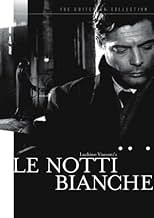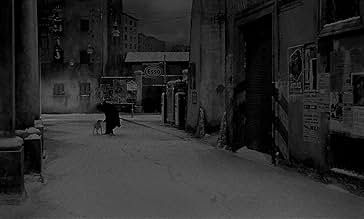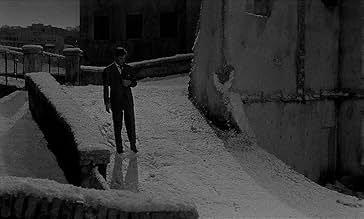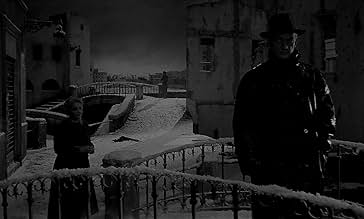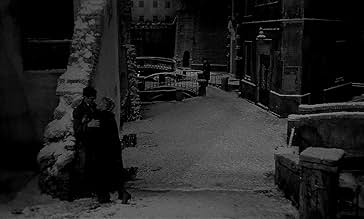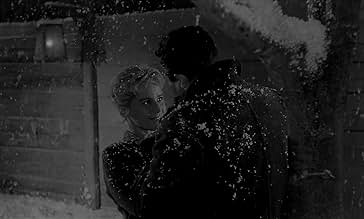IMDb RATING
7.7/10
9.6K
YOUR RATING
A humble clerk courts a woman who awaits her lover's return night after night.A humble clerk courts a woman who awaits her lover's return night after night.A humble clerk courts a woman who awaits her lover's return night after night.
- Director
- Writers
- Stars
- Awards
- 7 wins & 7 nominations total
Maria Zanoli
- La domestica
- (as Maria Zanolli)
Dirk Sanders
- Il ballerino
- (as Dick Sanders)
Giorgio Albertazzi
- L'inquilino
- (uncredited)
- …
Lys Assia
- La cantante
- (uncredited)
Alberto Carloni
- Il locandiere
- (uncredited)
Dino D'Aquilio
- Un ragazzino
- (uncredited)
Enzo Doria
- Il marinaio che balla
- (uncredited)
- Director
- Writers
- All cast & crew
- Production, box office & more at IMDbPro
Featured reviews
This film is very good adaptation of the short novel of Fyodor Dostoevsky.Some days ago he saw "Lo Straniero" (the Stranger) adapted from the novel of Albert Camus.It seems that Luchino Visconti is fond of dramatic stories with complicated characters.
In this story we have all moments of feelings: sadness of Maria waiting on the bridge, joy when they go for dancind or when the snow is falling, anger when there was misunderstanding between them.
Other important thing: the photography is extraordinary: in this time Fellini, Visconti,Antonioni had the best cameramen of Italy !!
Finally the performances of Marcello Mastroianni and Maria Schell are excellent: they give strength to the film.
In a cold night, the lonely ordinary man Mario (Marcello Mastroianni) is wandering along the empty streets of Livorno after spending the day with the family of his employer. While crossing a bridge, Mario sees a beautiful woman crying and he starts a conversation with her. The reluctant Natalia (Maria Schell) finally accepts his companion to walk her home and they schedule to meet each other on the next day at the same place at 10:00 PM. The romantic and naive Natalia tells Mario that she is Slav and lives with her grandmother. They survive repairing fancy carpets and renting a room in their house. When an unknown tenant (Jean Marais) rents the room, Natalia immediately falls in love with him. However, the man asks for one year apart to raise enough money to get married with her and promising to return and meet her on the bridge where Mario met her in the previous night. She gives a letter to Mario to deliver to the stranger but Mario throws it away in the canal. On the next night, Natalia meets Mario by chance and they spend the snowing night together, dancing, chatting and drinking, and Mario falls in love with her; but while walking back home, the couple sees a man alone on the bridge.
"Le Notti Bianche" is one of the most beautiful romances I have ever seen. The melancholic, utopist and timeless love story is a different film from the genius Luchino Visconti, based on the novel by Fyodor Dostoyevsky, and was shot in magnificent sets that rebuilt a non- faithful quarter of Livorno in the Cinecittá in the opposite direction of the Italian Neo-Realism. The chemistry between Marcello Mastroianni in one of his best roles and the gorgeous and sweet Maria Schell with her delightful smile in the role of a dreamer is amazing and one of the greatest attractions of this lovely film. The haunting cinematography in black and white is comparable to the German Expressionism with the use of lighting and shadows. Last but not the least, the unforgettable music score of Nino Rota completes this stunning and unknown masterpiece. The DVD released in Brazil by Versátil Dstributor has restored images and perfect sound that highlight the wonderful cinematography. My vote is ten.
Title (Brazil): "Noites Brancas" ("White Nights")
"Le Notti Bianche" is one of the most beautiful romances I have ever seen. The melancholic, utopist and timeless love story is a different film from the genius Luchino Visconti, based on the novel by Fyodor Dostoyevsky, and was shot in magnificent sets that rebuilt a non- faithful quarter of Livorno in the Cinecittá in the opposite direction of the Italian Neo-Realism. The chemistry between Marcello Mastroianni in one of his best roles and the gorgeous and sweet Maria Schell with her delightful smile in the role of a dreamer is amazing and one of the greatest attractions of this lovely film. The haunting cinematography in black and white is comparable to the German Expressionism with the use of lighting and shadows. Last but not the least, the unforgettable music score of Nino Rota completes this stunning and unknown masterpiece. The DVD released in Brazil by Versátil Dstributor has restored images and perfect sound that highlight the wonderful cinematography. My vote is ten.
Title (Brazil): "Noites Brancas" ("White Nights")
10Gigi-83
"The white nights" is a very fragile exquisite tale based on story of Dostoievsky. With the images extremely beautiful it tells the story of an ordinary young man Mario, who met an unusual, like from another century girl, fell in love with her and almost made her fall in love too and then lost her forever. Here two different worlds collide unambiguously - the modern, cold, indifferent stylized world and the old, more intimate and hearty one, and this collision makes many ironical and sad situations. Mastroiani plays one of his best role and looks like a real melancholic looser, Shell is eccentric, touching and gentle with her little hat and ridiculous gorgette ( dresses made by Piero Tosi seems to be the another participants of performance, so nice and expressive they are). Marais seems imperturbable like always and looks very mysteriously, a kind of fatal personage, incarnation of doom. In general film is very nice, gently and by the end tear-wringing (that's not bad indeed) and Visconti with his talent of turning usual realistic details into symbolic made this story even more beautiful then in a book.
This film is very good indeed. Visconti confirms what everybody knows: he is a master! The plot is based on a Dostoievski tale, where a love triangle is explored in the minimum psychological details. Actually, it shows the impact of a powerful passion on human behavior, it tries to explore the incredible power that love has on people's behavior, mainly when passion and irresistible attraction are present. The author tries to show that we are capable of believing anything as well as having childish attitudes when we are confronted with passion. Moreover Visconti is very elegant when dealing with all the elements, combining them with great precision.
Also it is fine to see Maria Schell and Mastroianni acting.
Also it is fine to see Maria Schell and Mastroianni acting.
A wonderful, very touching rendition of Dostoevsky's 1848 short story "White Nights."
A lonely young man (Marcello Mastroianni) meets and instantly falls for a young woman (Maria Schell) in the street one night, but finds out she is waiting for a man who she fell in love with a year ago, and who promised to return (Jean Marais). As Mastroianni makes headway with Schell in the other man's absence and she tells him honestly that it would take time for her devotion to change, we see that it's a dual story of needing the patience to wait for love to come around, which may have one outcome or another.
Director Luchino Visconti gives us a dreamy atmosphere in the streets at night with beautiful framing, lights, and fog. The scenes in the rain and snow were memorable, and I loved how tightly he told this story, including the use of the flashback. It's a romantic tale full of the emotions from the heart, but he avoids it from being cloying, and includes a wonderfully long dance scene, including the energy and passion of strangers dancing, as well as the couple's awkward attempts (Mastroianni is pretty funny).
Another amusing scene is when Mastroianni promises to help Schell write a letter to the other man, and after they begin, she gently guides him. "Dear Sir," he begins, and she says no, "Kind Sir." He goes on with "Excuse me for writing to you, but you must forgive..." and she interjects with "Forgive my impatience but..." He admits that sounds all right and continues "For a whole year I've been waiting," and she interrupts with "I've been sustained by a joyous hope..." It's a lovely scene between the two, and shows us the Mastroianni's conflicted emotions and Schell's sweetness.
Mastroianni turns in an excellent performance, and the scene under the bridge is fantastic. I think Schell was probably a little less successful in her role, as she seemed to lack depth and smiled too often, but at the critical moments she delivered. The rest of the cast are in much smaller parts, some of which worked (the grandma is adorable), and some of which seemed a little off (Marais, playing the other guy, seems way too old, though I found the difference in ages wasn't as big as I would have guessed; Maris 44 and Schell 31).
The film gets better as it goes along and finishes strong, with a powerful ending that's brilliantly shot by Visconti.
My favorite quote from the film is from that fantastic scene under the bridge, with Schell in Mastroianni's arms, and he says to her: "I wish I could make you fall asleep like the character in the fairy tale, who'll only wake up on the day she is to find happiness. It'll be like that for you too. One day you'll wake up and find that it's a lovely day. The sun will be shining, and everything will be fresh and clean. What once seemed impossible will seem simple and natural."
A lonely young man (Marcello Mastroianni) meets and instantly falls for a young woman (Maria Schell) in the street one night, but finds out she is waiting for a man who she fell in love with a year ago, and who promised to return (Jean Marais). As Mastroianni makes headway with Schell in the other man's absence and she tells him honestly that it would take time for her devotion to change, we see that it's a dual story of needing the patience to wait for love to come around, which may have one outcome or another.
Director Luchino Visconti gives us a dreamy atmosphere in the streets at night with beautiful framing, lights, and fog. The scenes in the rain and snow were memorable, and I loved how tightly he told this story, including the use of the flashback. It's a romantic tale full of the emotions from the heart, but he avoids it from being cloying, and includes a wonderfully long dance scene, including the energy and passion of strangers dancing, as well as the couple's awkward attempts (Mastroianni is pretty funny).
Another amusing scene is when Mastroianni promises to help Schell write a letter to the other man, and after they begin, she gently guides him. "Dear Sir," he begins, and she says no, "Kind Sir." He goes on with "Excuse me for writing to you, but you must forgive..." and she interjects with "Forgive my impatience but..." He admits that sounds all right and continues "For a whole year I've been waiting," and she interrupts with "I've been sustained by a joyous hope..." It's a lovely scene between the two, and shows us the Mastroianni's conflicted emotions and Schell's sweetness.
Mastroianni turns in an excellent performance, and the scene under the bridge is fantastic. I think Schell was probably a little less successful in her role, as she seemed to lack depth and smiled too often, but at the critical moments she delivered. The rest of the cast are in much smaller parts, some of which worked (the grandma is adorable), and some of which seemed a little off (Marais, playing the other guy, seems way too old, though I found the difference in ages wasn't as big as I would have guessed; Maris 44 and Schell 31).
The film gets better as it goes along and finishes strong, with a powerful ending that's brilliantly shot by Visconti.
My favorite quote from the film is from that fantastic scene under the bridge, with Schell in Mastroianni's arms, and he says to her: "I wish I could make you fall asleep like the character in the fairy tale, who'll only wake up on the day she is to find happiness. It'll be like that for you too. One day you'll wake up and find that it's a lovely day. The sun will be shining, and everything will be fresh and clean. What once seemed impossible will seem simple and natural."
Did you know
- TriviaAustrian actress Maria Schell learnt the script in Italian and spoke all her lines in Italian during the shooting, which won her the admiration of the Italian cast and crew. It was subsequently decided not to dub her voice by an Italian actress, which was the usual practice at the time.
- Goofs(at around 4 mins) When the bar closes and the owner exits it, he pretends to take out keys from his pocket to lock the door. But, as the camera moves away, the actor portraying the owner of the bar, can be seen putting the keys back in his pocket without locking the door.
- ConnectionsEdited into Meine Schwester Maria (2002)
- SoundtracksThirteen Women
Written by Dicky Thompson (as Thomson), Gadda and Lidianni
Decca Records Inc. New York U.S.A.
Performed by Bill Haley and the Comets (as Bill Haley and His Comets)
- How long is White Nights?Powered by Alexa
Details
- Release date
- Countries of origin
- Language
- Also known as
- Bele noći
- Filming locations
- Production companies
- See more company credits at IMDbPro
Box office
- Gross worldwide
- $6,497
- Runtime1 hour 37 minutes
- Color
- Sound mix
- Aspect ratio
- 1.66 : 1
Contribute to this page
Suggest an edit or add missing content


![Watch Trailer [OV]](https://m.media-amazon.com/images/M/MV5BZDE1MmJhZTctZDhhNC00ZmYxLTgzYmQtODc4ZTE1YTM3NTAxXkEyXkFqcGdeQXRyYW5zY29kZS13b3JrZmxvdw@@._V1_QL75_UX500_CR0)
